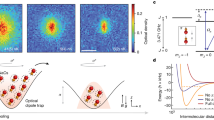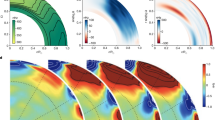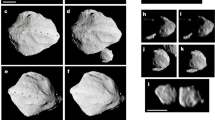Abstract
SEVERAL lines of evidence suggest that the time interval of early heating in the solar system was short in comparison with the total age of solid matter. The fast heating process has been attributed to radiogenic matter of short half life. Urey was the first to point out the possible significance of 26Al in this respect1, but certain difficulties eventually led him to question this hypothesis2. Interest was again aroused with Reynolds's discovery3,4 of radiogenic daughter 129Xe and, together with 244Pu fission tracks5, this attests to the presence of short-lived sources of radiogenic heat in the protosolar nebula. Fish, Goles and Anders have studied the hypothesis of extinct radionuclide heating in great detail and have provided specific estimates of the required nuclide concentration for melting and differentiation6.
This is a preview of subscription content, access via your institution
Access options
Subscribe to this journal
Receive 51 print issues and online access
$199.00 per year
only $3.90 per issue
Buy this article
- Purchase on Springer Link
- Instant access to full article PDF
Prices may be subject to local taxes which are calculated during checkout
Similar content being viewed by others
References
Urey, H. C., Proc. US Nat. Acad. Sci., 41, 127 (1955).
Urey, H. C., Physics and Astronomy of the Moon (edit. by Kopal, Z.), chap. 13 (Academic Press, N.Y., 1962).
Reynolds, J. H., Phys. Rev. Lett., 4, 8 (1968).
Reynolds, J. H., J. Geophys. Res., 68, 2939 (1963).
Fleischer, R. L., Price, P. B., and Walker, R. M., Geochim. Cosmochim. Acta (in the press).
Fish, R. A., Goles, G. G., and Anders, E., Ap. J., 132, 243 (1960).
Sonett, C. P., and Colburn, D. S., Nature, 216, 340 (1967).
Sonett, C. P., and Colburn, D. S., Physics of the Earth and Planetary Interiors (Elsevier, in the press).
MacDonald, G. J. F., J. Geophys. Res., 69, 2933 (1964).
Fricker, P. E., Reynolds, R. T., and Summers, A. L., J. Geophys. Res., 72, 2649 (1967).
Parker, E. N., Interplanetary Dynamical Processes (Interscience, New York, 1963).
Rikitake, T., in Electromagnetism and the Earth's Interior (Elsevier, Amsterdam, 1966).
Weber, E. J., and Davis, jun., L., Ap. J., 148, 217 (1967).
Modisette, J. L., J. Geophys. Res., 72, 1521 (1967).
Hayashi, C., Pub. Astron. Soc. Japan, 13, 450 (1961).
Ezer, D., and Cameron, A. G. W., Icarus, 1, 422 (1963).
Kuhi, L. V., Ap. J., 140, 1409 (1964).
Herbig, G. H., in Advances in Astronomy and Astrophysics, 1 (Academic Press, New York, 1962).
Kraft, R. P., Ap. J., 150, 551 (1967).
Author information
Authors and Affiliations
Rights and permissions
About this article
Cite this article
SONETT, C., COLBURN, D. & SCHWARTZ, K. Electrical Heating of Meteorite Parent Bodies and Planets by Dynamo Induction from a Pre-main Sequence T Tauri “Solar Wind”. Nature 219, 924–926 (1968). https://doi.org/10.1038/219924a0
Received:
Revised:
Issue Date:
DOI: https://doi.org/10.1038/219924a0
This article is cited by
-
What was the Volatile Composition of the Planetesimals that Formed the Earth?
Earth, Moon, and Planets (2008)
-
Of asteroids and onions
Nature (2003)
-
Magnetism of the Moon - a lunar core dynamo or impact magnetization?
Surveys in Geophysics (1993)
-
On the asteroidal conductivities as inferred from meteorites
The Moon and the Planets (1983)
-
Supernovae and lunar melting
Nature (1978)
Comments
By submitting a comment you agree to abide by our Terms and Community Guidelines. If you find something abusive or that does not comply with our terms or guidelines please flag it as inappropriate.



